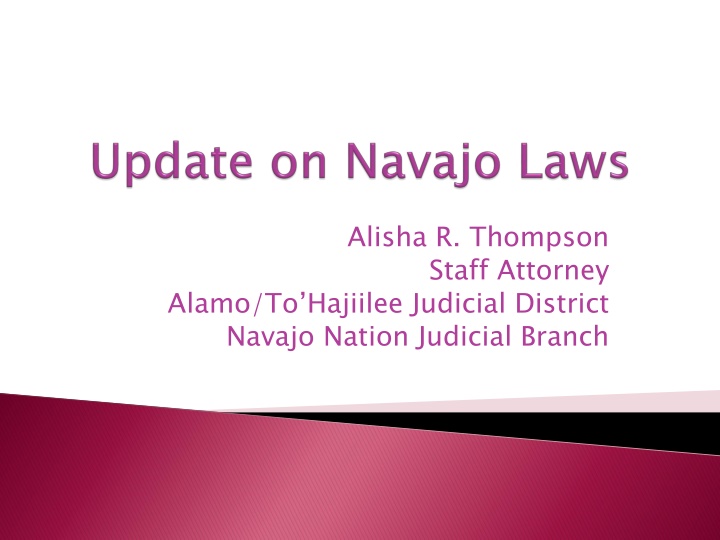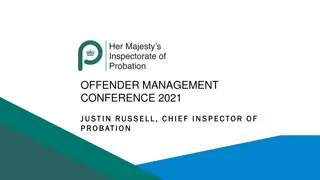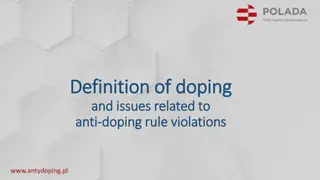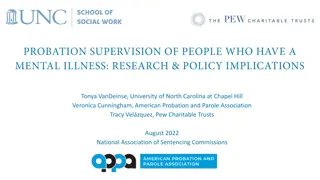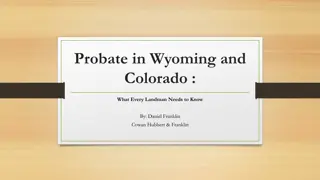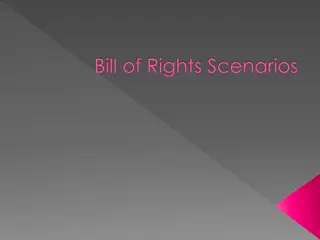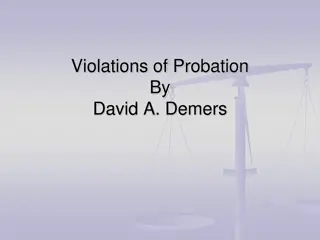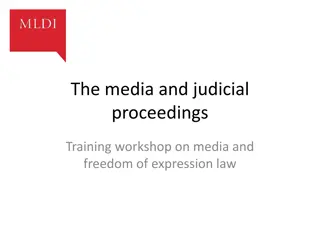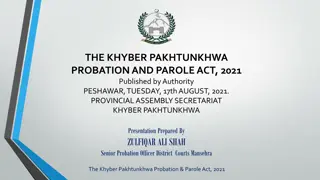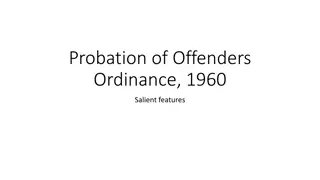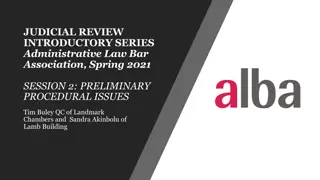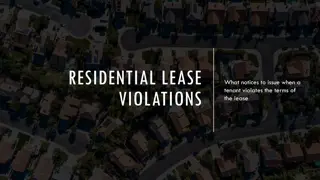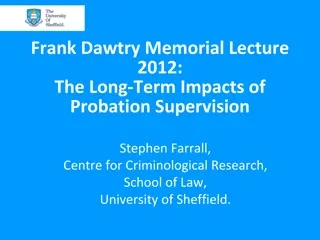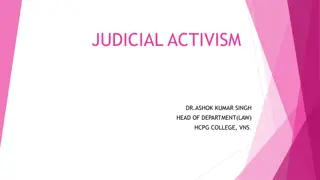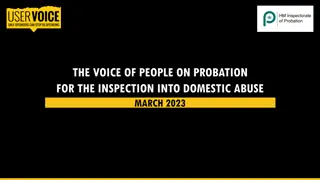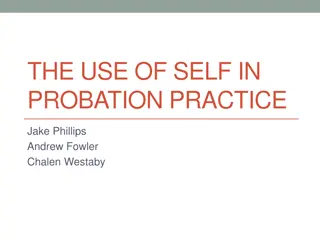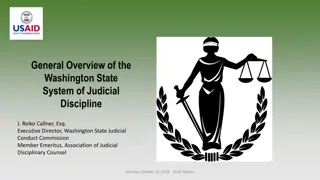Legal Proceedings and Probation Violations in the Judicial System
A staff attorney, Alisha R. Thompson, navigates cases involving the Violence Against Families Act, probation violations, and legal procedures. The narrative delves into instances of alleged violations, court orders, and attempts for credit against sentences, highlighting challenges in the criminal justice system.
Download Presentation

Please find below an Image/Link to download the presentation.
The content on the website is provided AS IS for your information and personal use only. It may not be sold, licensed, or shared on other websites without obtaining consent from the author.If you encounter any issues during the download, it is possible that the publisher has removed the file from their server.
You are allowed to download the files provided on this website for personal or commercial use, subject to the condition that they are used lawfully. All files are the property of their respective owners.
The content on the website is provided AS IS for your information and personal use only. It may not be sold, licensed, or shared on other websites without obtaining consent from the author.
E N D
Presentation Transcript
Alisha R. Thompson Staff Attorney Alamo/To Hajiilee Judicial District Navajo Nation Judicial Branch
Violence Against Families Act Sex Offender Registration and Notification Act of 2012 Domestic Abuse Protection Act lch n Violence Against Families Act Sex Offender Registration and Notification Act of 2012 Domestic Abuse Protection Act lch n Bi Bi Beehaz annii Beehaz annii Act 2011 Act 2011
Battery, 365 days of jail, suspended to 365 days of probation with conditions, and $500 fine Three months into probation, petition to revoke probation alleging he failed to check in but called his probation officer to inform that he left the area and possessed or used intoxicating liquor or controlled substance A copy of the revocation petition was provided to PPS to be mailed when he discloses his current address, no summons A bench warrant a day after petition filed Arrested and served with a notice of hearing/criminal summons/petition for revocation hearing the next day Order of temporary commitment without specific findings why detention was necessary
Admitted to the alleged probation violations and reinstated the original jail sentence of 365 days and remanded him to detention Several pro se motions requesting credit for jail time served and for the elapsed time he served on probation as credit against the sentence Motions denied stating that no actual jail time was served on the underlying battery charge Hand written letter accepted as a petition for writ of habeas corpus A hearing was held on the writ and he was released
Nav. R. Cr. Pro. Rule 53(b) requires a showing of futility in getting defendant to respond, meaning either that the defendant disappeared with no way to contact him or her, or that defendant showed by egregious past conduct that he or she will not appear in the future PPS received a phone call regarding his homelessness and his need to find shelter but no indication that PPS tried to address or accommodate his shelter issues
Din bi beenahazanii, which emphasizes restorative justice, imposes a duty on our government to provide avenues for restoration so that it does not throw anyone away. It is a fundamental right of our people to expect that their governmental agencies pursue restorative measures, especially where dire living circumstances are beyond a defendant s control, as in this case. The prosecution and PPS had the discretion and responsibility to find a solution for Haungooah other than seek reinstatement of his original jail sentence. Such assistance gives a community hope by ensuring rehabilitative services so that offending members can be treated rather than merely punished or expelled. Haungooah Sup. Ct. June 4, 2013). Haungooah v. Greyeyes Sup. Ct. June 4, 2013). v. Greyeyes, No. SC No. SC- -CV CV- -06 06- -13 slip op. at 7 (Nav. 13 slip op. at 7 (Nav.
To provide for the safety and protection of family members from violence; To recognize that family violence is contrary to the traditional Navajo way of life and is a violation of fundamental human rights; To utilize the criminal justice system to impose consequences upon individuals for behaviors that violate traditional Navajo values, such as K e and Hozho; and To require the criminal justice system to respond to family members with fairness, compassion and in a prompt and effective manner.
Any criminal act as defined under the VAFA committed by a family member against another family member resulting in: Physical harm, including bodily injury and sexual assault; A threat causing imminent fear of bodily injury; Emotional distress; Stalking; Harassment; Electronic harassment; Criminal trespass; or Financial or economic loss.
Present or former spouse (including common law and traditional) Household member Parent Legal guardian Present or former stepparent Present or former stepchildren Former in-law Relative to the second affinity (aunts, uncles, nieces, nephews, cousins, grandparents, grandchildren) Individual having continued personal relationship
Stalking (with or without surveillance); 539 Harassment; 540 Sexual assault of a family member; 541 Unlawful imprisonment; 542 Aggravated assault of a family member; 543 Battery of a family member; 544 Aggravated battery against a family member (deadly weapon or serious bodily injury); 545 Possession of a firearm; 546 Trespass with force or violence; 547 Burglary against a family member; 548 Threatening of a family member (terrorize); 549
Custodial interference; 550 Unlawful use of a weapon against a family member (without or without being under the influence); 551 Criminal entry involving a family member (enters or refuses/fails to leave); 552 Criminal damage involving family violence; 553 Violation of family violence court order; 554 Robbery of a family member; 555 Conspiracy against a family member; 556 Solicitation against a family member; 557 Aggravated solicitation of a minor family member; 558 Arson against a family member; 559
Law enforcement SHALL arrest an alleged offender if there is probable cause to believe that the alleged offender has committed a crime involving family violence. There is no need for a warrant. Alleged offender can be without bond for 36 hours before a judge orders further detainment. If alleged offender is arrested on a Friday, Saturday, Sunday or day before a holiday, and is allowed to post bail within 36 hours, but does not, may be held for an additional 8 hours after the opening of Court on the next day it is in session.
The Court may impose any reasonable condition of sentence which strives to rehabilitate the defendant or serves the reasonable needs of the victims of crime and of society. Must be consistent with the sentencing terms established for each offense. Can include fines, probation, rehabilitative treatment after assessment, incarceration, community service, restitution or n ly h, restore harmony between victim and offender, electronic monitoring, pay costs. 220. Incarceration is considered an extreme measure and used as a last alternative. 220. Can use peacemaking program to make a sentencing recommendation.
A victim of family violence has a right to be treated with fairness, respect and dignity within the criminal justice system. A victim of family violence has a right to have the criminal justice system respond in a prompt and timely manner. 1. Be protected from the accused individual; 2. Participate in the criminal justice system by being present and heard; 3. Be accompanied by an advocate of his/her choice; 4. Be provided information about the sentencing and imprisonment of the accused individual; 5. Be notified of the offender s release prior to his/her release;
Be timely notified of court proceedings; Be notified of his/her rights and be provided with information at the time the crime occurs; Restitution and enforcement orders; Be free of intimidation, harassment, abuse, uninitiated contact; and An interpreter or translator. 6. 7. 8. 9. 10.
A victim may refuse to disclose the content of oral communication and written records concerning the victim. A victim may request any volunteer or employee of a domestic violence program from disclosing information concerning the victim. Confidentiality DOES NOT relieve a person from reporting child abuse or neglect. Can disclose information compiled about incidents of family violence if the identity of the victim and his/her family members is protected. Only the victim can waive the privilege. The waiver must be in writing and identify what information may be disclosed and for what purpose. The waiver is limited to 30 days, but the victim can revoke the waiver earlier.
17 N.N.C. 2100 et seq. (2012), amended by CJN-31-14 (2014)
The Navajo Nation acts to protect the public, particularly children, from sex offenders by requiring the registration of convicted sex offenders who reside, work or go to school within Navajo Indian Country and notification to the community of such convicted sex offenders in accordance with this Act and Title I of the Adam Walsh Child Protection and Safety Act of 2006, 42 U.S.C. 16901 et seq.
Tier 1 every year for 15 years Tier 2 every 6 months for 25 years Tier 3 every 3 months for life Within 3 business days prior to release from Navajo corrections facility Within 3 business days of sentencing which does not include incarceration Within 3 business days of coming into the Navajo Nation
Failure to register or absconding Up to 365 days incarceration Register 3 days prior to incarceration and in accordance with the tier level of the original sex offense Non-Indians are arrested and places into federal custody for consideration of federal prosecution
Navajo Nation Sex Offender Registry for the Public: Public website that provides information about convicted sex offenders who reside, work or go to school within Navajo Indian Country; 2114 Pursuant to 2116, whenever a sex offender updates information, NPD: Update NNSORPP Notify Navajo SORNA unit Notify Child Protective Services and those who conduct background checks Notify schools, chapters, housing areas and businesses
It is the policy of the Navajo Nation to demonstrate respect for Navajo family and clanship; abuse within families will not be tolerated. 1602. The DAPA is intended to protect individuals, family members and clan members from abuse in domestic settings. 1604.
Domestic abuse is assault, battery, threatening, coercion, confinement, damage to property, emotional abuse, harassment, sexual abuse, and other conduct constituting an offense or tort under Navajo Nation laws upon a victim. 1605(A)(1). An abuser is any person who engages in the domestic abuse as defined above. 1605(C). A victim must be either a member or former member of the abuser s household, person involved or formerly involved in an intimate relationship with the abuser, person who interacts with the abuser in an employment, academic, recreational, religious, social or other setting, offspring of the abuser, relative or clan member of the abuser, an elderly person, or a vulnerable person. 1605(B).
Issued when a preponderance of the evidence shows that it is more likely than not an act of domestic abuse occurred or is about to occur; 1665(b)(4) Relief is very broad: no further abuse, stay away, property distribution/protection, custody/visitation of minor children; 1660 Remains in effect for five years unless otherwise specified; 1662(C) Violations can be prosecuted criminally and civilly; 1663 Can be renewed, extended, modified and vacated at any time before its expiration; 1662(d) and 1664 May be referred to Peacemaking; 1652
The Court shall have jurisdiction over all proceedings in which a child is alleged to be a dependent child, a child in need of supervision, or a delinquent child. 1004(A). The Court shall have jurisdiction of: 1. The termination of parental rights; 2. The adoption of a child; 3. Determining physical and/or legal custody of, or to appoint a custodian or guardian for a child; 4. The commitment of a mentally ill or mentally disabled child; 5. The authorization of the marriage of a minor; 6. The emancipation of a child. 1004(B).
The Navajo Nation has a legitimate and compelling interest, parens patriae, in the well-being, welfare and safety of those children who come within its jurisdiction; that they grow up to become free, independent, and well-developed individuals and citizens; in ensuring that, to the extent possible, family units remain intact; and also in protecting and maintaining the safety and integrity of the community as a whole. CO-38-11 2(1).
The Navajo Nation Supreme Court acknowledged that children, even unborn children, occupy a place in Navajo society that can best be described as holy or sacred. CO- 38-11 2(2). Children coming within the jurisdiction of the Navajo Nation face myriad hazards to their mental and physical well-being from delinquency, incorrigibility, truancy, neglect, abuse, exploitation and other ills. CO-38-11 2(3).
Children coming within the jurisdiction of the Navajo Nation face clear and present danger from exploitation, torture, abuse, neglect, truancy, and delinquency; the Navajo Nation has an obligation to act in an aggressive and culturally appropriate manner to protect its most vulnerable and precious resource, to reserve, to restore harmony and to promote unity to individuals, families and the community pursuant to Navajo statutory law and Din bi beehaz annii with the cooperation of other governments and agencies; while at the same time honoring and respecting the rights of parents. CO-38- 11 2(4).
Current laws concerning dependency, child in need of supervision, delinquency, termination of parental rights, and Indian Child Welfare Act proceedings require revision, amendment and/or repeal in order to efficaciously meet the Navajo Nation s obligations to its children who come within its jurisdiction in a culturally appropriate manner that seeks to preserve, restore and facilitate the harmony and unity of the family unit; protects and cares for the mental and physical well-being of children and families; preserves family unity; involves families in treatment, rehabilitation and aftercare; intervenes ad educates in family disharmony; and ensures fundamental fairness in process and procedure for every individual who comes within the jurisdiction of the Navajo Nation.
The Alchn bi Beehaz'anii Act specifically restores traditional Navajo philosophy and values to laws governing the disposition of Navajo Nation children. James v. Window Rock Family Court, No. SC-CV-06-12, slip op. at 10 (Nav. Sup. Ct. Oct. 8, 2012). The philosophy expressed in Alch n bi Beehaz' anii Act provides that termination of parental rights is not the custom or tradition of the Navajo people and that severance of the parent-child relationship can be sought as a last resort and after all options, including customary adoptions, are considered by the party requesting the termination of the parent/child relationship. Id. citing 1401. Adopted customary adoptions which is consistent with the philosophy embodied in our laws. Id., slip op. at 12.
The Court is authorized to cooperate fully with any federal, state, Navajo Nation, public or private agency to participate in any diversion, rehabilitation, training, peacemaking programs and to receive grants in aid to carry out the purposes of this Chapter. 1003(A). The Court may accept or decline state court transfers of child custody proceedings; however, it shall be the policy of the Navajo Nation that, absent good cause, child custody proceedings involving Navajo children should be heard in the Navajo Nation Courts. 1003(B).
The Division is the lead Navajo Nation agency that shall preserve and restore the harmony and unity of the family by providing for the safety, wellbeing and protection of children and families which come within the jurisdiction of the Navajo Nation pursuant to this Code and established policies and procedures. 1006(A). The Division provides protective service, including receiving reports of abuse/neglect, conduct an investigation with law enforcement, take children in protective custody, refer to the prosecutor for prosecution. 1006(B). The Division may cooperate with state and community agencies and negotiate working agreements with other jurisdictions, subject to ratification by the Navajo Nation Council. 1006(C).
Law Enforcement shall investigate dependency, child in need of supervision and delinquency reported or referred to it by any individual or agency. 1007(A). Law Enforcement shall be available 24 hours a day 7 days a week to respond to and investigate reports of alleged dependency, child in need of supervision and delinquency. 1007(B).
The Office of the Prosecutor shall represent the Navajo Nation in all proceedings under this Code. 1008(A). The Prosecutors shall consult with the Division when dependency proceedings are initiated to ensure that the best interests of the child are served. 1008(B). When Child in Need of Supervision or Delinquency Proceedings are initiated, the Prosecutor shall consider and dispose of the proceeding in a way that restores K to the child, their family, and his/her surroundings. 1008(C).
A meeting convened by the Division including family members and, if the family consents, professionals who work with the child and family, such as the teachers, psychologists, extended family, religious or traditional counselors, and friends. 1002(T). The goal is to ensure families re-assume primary responsibility, t hw j t eego, with guidance from the Division, in regard to children s safety and well-being to eliminate the need for Court intervention. 1101(A). The Division is required to refer every reported and substantiated case of child abuse and neglect to a family group conferencing when the abuse or neglect does not require removal. 1101(B).
The Division may refer cases involving family disputes or neglect where the child has not been removed to a family group conferencing through the Peacemaking Program. 1101(C). Concerned family members and professional may refer any matter concerning a child to family group conferencing either through the Division or Peacemaking Program. Such a referral shall not preclude removal if reasonable grounds exist to believe that the child is abused and/or neglected and removal is necessary. 1101(D). A Court may refer a matter to family group conferencing either through the Division or Peacemaking Program at any time after a petition is filed. 1101(E).
A meeting initiated by the Division and including family members to discuss a family resolution to alleviate the dependency issues. 1002(S). The Division must conduct within 48 hours of the child being taken into custody, excluding Saturdays, Sundays and holidays. 1104(A). Referred to: Services within the Division to work with the family so it is safe for the child to return to the family OR To the Prosecutor within 72 hours of taking the child into custody to assess whether to file a dependency proceeding. 1104(A).
At any time after a petition is filed, but before the adjudicatory hearing the Prosecutor and Respondent(s) may file a motion to suspend the proceedings to complete an informal adjustment plan developed by all parties and supervised by the Division, which shall not exceed 6 months. 1107(A). Informal adjustment shall only be utilized when it promotes the best interests of the child and protects the child s health and safety. 1107(B). Upon completion of the plan the petition will be dismissed by motion of the Prosecutor. 1107(D). Should the Respondent(s) not comply with the plan, the dependency action may be reinstated by motion of the Prosecutor. 1107(E).
If the Court orders continued out of home placement, the Court shall make a finding that return of the child would be contrary to the welfare of the child and that reasonable efforts have been made to prevent continued removal of the child. 1113(C). Reasonable efforts shall be made to preserve and reunify the family, with the paramount concern being the child s health and safety. The Court shall make a determination within 60 days of the child being removed that reasonable efforts to reunite the family have been offered to the family. Such efforts may include the Court making a determination that reunification should be facilitated by referring the family to the Peacemaking Program. 1113(F).
Alisha R. Thompson Staff Attorney To Hajiilee and Alamo Judicial District Courts P.O. Box 3101-A To Hajiilee, NM 87026 Tel: (505) 908-2817/2818 Fax: (505) 908-2819 athompson@navajo-nsn.gov
